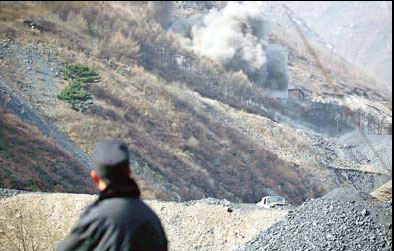Eyes in sky to watch illegal mines
The owners of illegal mines may get their profits from deep beneath the ground but it is from above that they could soon be held accountable, now that the capital may use satellites and unmanned aircraft to monitor illegal mining.
 |
|
An enforcement officer checks the blasting of three small illegal coal mines on Tuesday in Fangshan district. |
"Satellite remote sensing has been used to monitor arable land and construction land and it could be an effective measure to curb illegal mining," said Luan Peng, a staff member with the information office of the Beijing Municipal Bureau of Land and Resources.
Because illegal miners stack coal at the surface on a large scale, the pits will be easily seen in satellite pictures.
In addition, photographs taken from unmanned planes flying over areas known to have a lot of mining activity will be used, Beijing News reported, quoting an unnamed worker within the bureau.
Illegal mining in the suburban areas has been a headache for many years because of the danger it poses to the environment and the poor safety conditions for workers. The illegal mines have long been the subject of crackdowns by the local government.
However, despite the crackdowns, illegal mining activity often resumes because of the large profits that can be made.
Shijiaying township stands on rich coal reserves in southeast Fangshan district. Eight of the 12 villages in the township have abundant coal and the industry once accounted for a third of the capital's coal production.
On Tuesday, three of the township's illegal mines were blasted shut by the authorities, according to the paper.
The 1.03 million tons of illegal coal stacked in the district will be transported out of the area before March 31, according to a press release from the district government on Nov 19.
The latest crackdown on illegal mining focuses on Fangshan district and neighboring Mentougou district but will also extend to gold and sand mining in Hairou district and Miyun county.
The coal-rich districts of Fangshan and Mentougou will have all of their illegal mines closed by the end of the year, Beijing Morning News reported.
The main work of the crackdown in future will be the identification of the owners of illegal mines because the closure of mines and the lay-off of workers, usually migrants from far away, does little to permanently end the illegal activity.
Efforts from the public security bureau and other departments will be devoted to the investigation of illegal mine owners, according to Beijing News.
And other long-term initiatives will also be introduced, such as check points and patrols in rural areas to search for shipments of illegal coal.
In addition, those who inform the authorities about illegal mining activities in Miyun county stand to receive a reward of up to 50,000 yuan.
The local government says it has set aside more than 10 million yuan for the fight against illegal mining in the areas that supply the capital's water because the area is also home to 98 percent of the city's proven reserves of minerals, according to Mirror Evening News.
 0
0 






